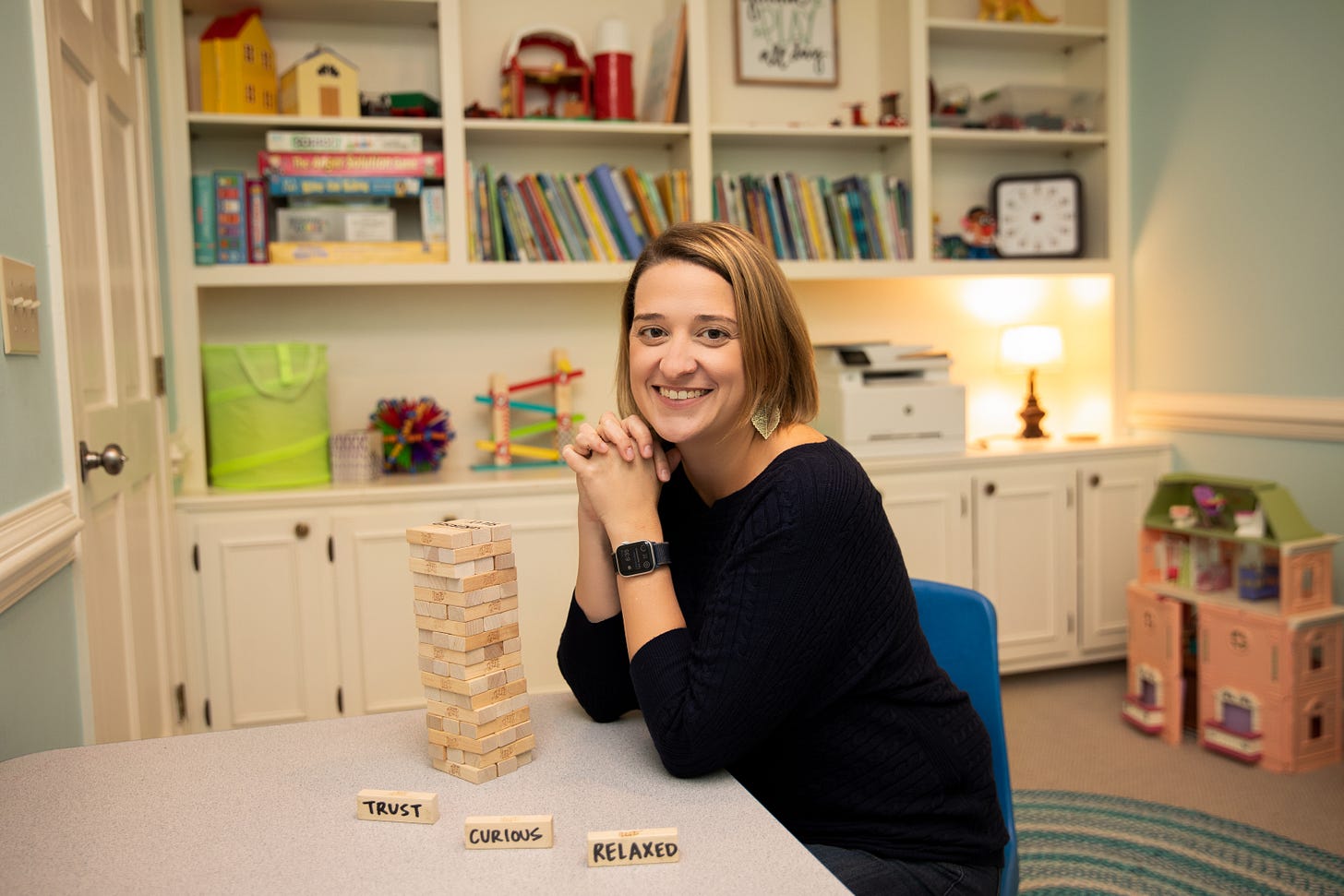
As a child psychologist, my experiences treating children have always been deeply intertwined with also treating families. Children do not exist in a vacuum and neither do their parents. We are all constantly interacting with stressors outside of our homes that make their way into our homes and into our family relationships. These stressors leave us tired.
If you're exhausted, then you are not alone. If we learned one thing from parenting through a global pandemic, it was this: We have a finite amount of energy and we need to pay attention to where we spend it. Situations either drain our energy or replenish it. We must notice the difference and then teach our children to do the same.
I referenced Maslow's Hierarchy of Needs time and again throughout the pandemic but it can apply to any stressful season of live when we feel we must prioritize our energy. During a season of stress, we survive at Level 1: Physiological Needs and Level 2: Safety Needs. When our physical and safety needs are consistently met, we are able to emerge into Level 3: Love and Belonging where we have the energy to connect with family, friends, and even meet new people. I want to point out here that feeling a sense of belonging in Level 3 comes before Level 4: Esteem and Level 5: Self-actualization which is related to achieving things in school or work. In our modern and capitalist culture, we often receive the message (and send the message to our children) that achievement comes before belonging, but I would argue that this is exactly what leads to feelings of overwhelm and loneliness.
During stressful seasons of life we likely only have the energy for Levels 1, 2, and maybe some 3 when we're rested. So, whether it’s living while processing grief, caregiving for an elderly parent, or managing a family and career while raising a neurodivergent child, it’s important to realize that exhaustion isn't just physical. It’s also mental, emotional, sensory, social, and spiritual.
Physical
Let's start with physical because it’s the first way we explain exhaustion to our kids. We know this feeling as how our body feels after we've walked all day at a theme park. Our kids know this feeling as playing all day at the beach and having no problem falling asleep that night. Our bodies have a limited amount of physical energy that is replenished with nutrition, hydration, and sleep.
What to do: Make one small change and see how it feels. Go on a walk. Drink a cold glass of water when you wake up. Add 20 minutes of stretching to your morning. No one is in a better position to care for your body than you are. No one else can feel what you need. No one else can do this for you. Just start by showing up for yourself.
Mental
Remember that feeling when you walked out of taking the SATs? Dazed and detached, right? As adults we feel mentally fatigued after a long day of being "on" at work. As parents raising neurodivergent kids, we hold all the things in our brain about our kids’ development, interests, progress, concerns, activities, academics, meetings, and more while we continue to feed everyone, keep the laundry going, and trying to remember if anyone has walked the dog today. If you feel like you can't remember things like you used to, that's because there's too much to remember and you are worn out by all the things.
What to do: Routines and systems are your best friend now. I'm sure you've figured lots of these out so far, but think about anything you keep forgetting and put a system in place to support your brain. A reminder, a sticky note, or delegating the job to another family member can be a part of this system. It’s not hard because you are doing it wrong. It’s hard because it’s too much. You have reached your limit; plan accordingly.
Emotional
Emotional tiredness is well-known to therapists as "compassion fatigue" and we are trained to recognize it and seek support when we experience it. Therapists are humans too and while we are trained to separate work and personal life, we are also feeling human beings who may absorb stress from our clients. We have a plan for this including consulting with colleagues, being super stingy about the amount of time we work, taking care of our bodies, and seeking out therapy for ourselves.
As a parent, you absorb your family's stress but you haven't been taught to notice emotional fatigue or what to do about it. Compassion fatigue might look like you getting irritated when your spouse is complaining about something or just wishing your child would magically be able to do the thing because you are tired of reminding them. Basically, you're feeling like you are having a hard time being compassionate, which we need to pay attention to as parents because if there's one thing our kids need from us it’s compassion.
What to do: The first thing to do is to build a break into your day that helps you repair emotionally. You might be able to do this by yourself because you just need 10 minutes of quiet. Or, get up 20 minutes before your first child wakes up and make this space and time your own. This will be hard at first, but once it’s a routine, it will get easier. If needed, talk to your partner, neighbor, friend, family member, or spiritual leader to help you feel less alone and to problem solve what you need to make your current situation more sustainable. Some people drain us and some people rejuvenate us. Notice how you feel after you spend time with people. Only spend time with people who make you feel better.
Sensory
We tend to think of sensory sensitivities as a pediatric concern, but many adults are sensory sensitive, too. Are you sensitive to how loud your kids are? How chaotic your house is? How much your kids physically climb on you? If you are irritated with the constant touching or noise from your family, your sensory system is likely overloaded. This overwhelm can be exacerbated by general stress being higher and lack of sleep. Notice if your kids are sensitive, too. If one sibling is sensory-seeking and the other is sensory-sensitive, it will be important to get one child more movement and the other child more quiet space, respectively.
What to do: Similar to emotional fatigue, sensory overwhelm can improve when you can get space from it and create boundaries around the time you are exposed to your triggers. Does one parent not mind loud and the other does? Talk this out with your parenting partner and see if the adult who doesn't mind it can take the lead at that time of day. Are you more sensitive on a workday versus a weekend? Plan activities accordingly.
Social
After living through the pandemic, many people are noticing the difference between socializing online versus in person. Humans are social beings who need connection but our social needs are different for each of us. While introverts likely didn’t hate reading books on their porch during quarantine rather than racing around town making chit chat with parents at soccer games, many extroverts went stir-crazy.
What to do: Whatever your flavor of social gathering, notice what you miss when you’re away from it and only say yes to the social engagements that energize you. Make your default response “no.” If it’s not a “Heck Yes! I’d love to do that! Then it’s a “no.” If you stay excited about something after a few days, maybe it’s a quiet “heck yes!” Just pay attention to what YOU want, not what others want from you. You are the only one who can truly know if an experience is worth your time.
Spiritual/Moral
Many adolescents share with me that they are very passionate about the work that needs to be done in the world regarding mental health, gun reform, systemic racism, disability rights, LGBTQ+ rights, and climate change. Yet, many kids and teenagers feel stress that they aren’t old enough to vote or make an impact. Any time a person feels strong convictions but limited power, it's exhausting and can lead to hopelessness. We live in a world that moves rapidly around us yet creating social or systemic change continues to feel so slow. Whether we have consciously thought about it or not, reading about current events are likely contributing to our fatigue. Sometimes, I think we are just not meant to absorb all the news of the world at once.
What to do: When your child is developmentally ready to learn about the hardships of our history as a nation or the journeys of those in your family tree, share those stories with them. Their ancestors have overcome great things and their generation will, too. Take action in small but certain ways in your community, like volunteering, and teach your child to do the same. Feeling we have the power to do small things will energize us, rather than drain us. Modeling this for our children is a privilege for us and a gift to them.
The bottom line: Know thyself. What have you learned about your personal fatigue limits in the past? Feeling physically drained is the easiest to figure out, but what about mental stress, emotional fatigue, sensory overload, or feeling a lack of purpose? Pay attention to your limits and commit to making changes that help you have more energy to sustain yourself through the hard things and to stay present for the wonderful things.
Let’s Stay Connected!
~Dr. Emily
P.S. What’s one small thing you’ve done that made a big impact on your energy? Tell us in the comments!
I’m Dr. Emily, child psychologist and former school psychologist, and I’m on a mission to help parents and teachers be the best adults we can be for the neurodivergent kids and teens in our lives. This isn’t about changing the kids, it’s about changing us. Learn more with my resources for parents, teachers, and schools at www.learnwithdremily.com.
**All content provided is protected under applicable copyright, patent, trademark, and other proprietary rights. All content is provided for informational and education purposes only. No content is intended to be a substitute for professional medical or psychological diagnosis, advice or treatment. Information provided does not create an agreement for service between Dr. Emily W. King and the recipient. Consult your physician regarding the applicability of any opinions or recommendations with respect to you or your child's symptoms or medical condition. Children or adults who show signs of dangerous behavior toward themselves and/or others, should be placed immediately under the care of a qualified professional.**






"If you feel like you can't remember things like you used to, that's because there's too much to remember and you are worn out by all the things."
And routines can help us too? How interesting is it to know that routines are both good for our children, and for us as the parent of a neurodivergent child!